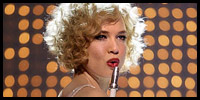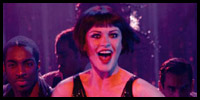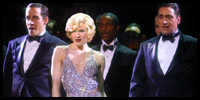
 |
Chicago (2002) Directed by Rob Marshall Cast: Renee Zellweger, Catherine Zeta-Jones, Richard Gere, Queen Latifah, John C. Reilly, Christine Baranski, Taye Diggs, Lucy Liu, Dominic West, Denise Faye, Mya Harrison, Deirdre Goodwin, Susan Misner, Colm Feore 2002 – 98 minutes Rated: Reviewed by Dustin Putman, December 20, 2002.  Comparisons between 2001's groundbreaking "Moulin Rouge" and "Chicago" are inevitable, if only because they are the only two big-budget musicals to grace the screen in the last two years. In tone and structure, they couldn't be any different. Whereas "Moulin Rouge" was a romanticized cinematic original that one could imagine being adapted for the stage, the more cynical "Chicago" is based on the immensely popular Broadway show by Bob Fosse and Fred Ebb, and filmed as such.
Comparisons between 2001's groundbreaking "Moulin Rouge" and "Chicago" are inevitable, if only because they are the only two big-budget musicals to grace the screen in the last two years. In tone and structure, they couldn't be any different. Whereas "Moulin Rouge" was a romanticized cinematic original that one could imagine being adapted for the stage, the more cynical "Chicago" is based on the immensely popular Broadway show by Bob Fosse and Fred Ebb, and filmed as such.
 Every time a musical number begins, the scene suddenly transplants the characters from their current setting onto a darkened stage lit by spotlights. This somewhat unorthodox stylistic decision disappointed for the first two numbers, if only because it proved difficult to get into the groove of things. Once gotten used to, "Chicago" takes off with one mesmerizing song after the next, interspersed between exposition sequences that are mere filler for the main attraction.
Every time a musical number begins, the scene suddenly transplants the characters from their current setting onto a darkened stage lit by spotlights. This somewhat unorthodox stylistic decision disappointed for the first two numbers, if only because it proved difficult to get into the groove of things. Once gotten used to, "Chicago" takes off with one mesmerizing song after the next, interspersed between exposition sequences that are mere filler for the main attraction.
 Set in 1920s Chicago—a glitzy city filled with deceit, lies, and treachery—Roxie Hart (Renee Zellweger) wants nothing more than to become famous. As the film opens, she lurks in the back of a nightclub as famed diva Velma Kelly (Catherine Zeta-Jones) performs "All That Jazz," imagining herself onstage in Velma's place. When the man (Dominic West) Roxie has been having an adulterous relationship with turns out to be a liar in his unkept promises about giving her her big break, she shoots and kills him. Sent to prison, Roxie meets Velma, who has been arrested for the double-murder of her sister and husband, and the two instantly get off on the wrong foot together. Even with the possibility of execution looming over Roxie's fate, she continues to concoct schemes with the help of hot-shot ace lawyer Billy Flynn (Richard Gere) in order to not only have the charges dropped, but to become a celebrity in the process.
Set in 1920s Chicago—a glitzy city filled with deceit, lies, and treachery—Roxie Hart (Renee Zellweger) wants nothing more than to become famous. As the film opens, she lurks in the back of a nightclub as famed diva Velma Kelly (Catherine Zeta-Jones) performs "All That Jazz," imagining herself onstage in Velma's place. When the man (Dominic West) Roxie has been having an adulterous relationship with turns out to be a liar in his unkept promises about giving her her big break, she shoots and kills him. Sent to prison, Roxie meets Velma, who has been arrested for the double-murder of her sister and husband, and the two instantly get off on the wrong foot together. Even with the possibility of execution looming over Roxie's fate, she continues to concoct schemes with the help of hot-shot ace lawyer Billy Flynn (Richard Gere) in order to not only have the charges dropped, but to become a celebrity in the process.
 If "Chicago," directed by Rob Marshall in his feature film debut, does not fully succeed in its translation from stage to screen (the story and its big-screen delivery are far more suited for the former), it is still a whole lot of fun. The musical numbers—the majority of which metamorphosize from Roxie's mind—are clearly its strongest suit, featuring sparkling choreography and moodily energetic production values. The opening "All That Jazz" is exquisitely entertaining, aided by Catherine Zeta-Jones' (2000's "Traffic") sultry turn as the vixenish Velma. The showstopper, however, belongs to "We Both Reached for the Gun," complete with Billy acting as ventriloquist to dummy Roxie, and the rest of the courtroom inhabitants on puppet strings.
If "Chicago," directed by Rob Marshall in his feature film debut, does not fully succeed in its translation from stage to screen (the story and its big-screen delivery are far more suited for the former), it is still a whole lot of fun. The musical numbers—the majority of which metamorphosize from Roxie's mind—are clearly its strongest suit, featuring sparkling choreography and moodily energetic production values. The opening "All That Jazz" is exquisitely entertaining, aided by Catherine Zeta-Jones' (2000's "Traffic") sultry turn as the vixenish Velma. The showstopper, however, belongs to "We Both Reached for the Gun," complete with Billy acting as ventriloquist to dummy Roxie, and the rest of the courtroom inhabitants on puppet strings.
 All of the actors involved have courageously used their own singing voices, and all of them are surprisingly good, if not as notably professional as Ewan McGregor and Nicole Kidman in "Moulin Rouge." Renee Zellweger (2002's "White Oleander") continues her long line of superb turns as the stubbornly determined Roxie, who cares more about being famous than she does about getting out of her sentence. As the debonair, undefeated Billy Flynn, Richard Gere (2002's "Unfaithful") hasn't been this smooth and comfortable onscreen in ages. In supporting roles, Christine Baranski (2000's "How the Grinch Stole Christmas"), as news reporter Mary Sunshine, and Lucy Liu (2000's "Charlie's Angels"), as cold-blooded murderer Go-to-Hell Kitty, have little to do. Better are Queen Latifah (2002's "The Country Bears"), a marvelously refined scene-stealer as prison guard Mama Morton, and John C. Reilly (2002's "The Good Girl"), as Roxie's sad and neglected husband Amos.
All of the actors involved have courageously used their own singing voices, and all of them are surprisingly good, if not as notably professional as Ewan McGregor and Nicole Kidman in "Moulin Rouge." Renee Zellweger (2002's "White Oleander") continues her long line of superb turns as the stubbornly determined Roxie, who cares more about being famous than she does about getting out of her sentence. As the debonair, undefeated Billy Flynn, Richard Gere (2002's "Unfaithful") hasn't been this smooth and comfortable onscreen in ages. In supporting roles, Christine Baranski (2000's "How the Grinch Stole Christmas"), as news reporter Mary Sunshine, and Lucy Liu (2000's "Charlie's Angels"), as cold-blooded murderer Go-to-Hell Kitty, have little to do. Better are Queen Latifah (2002's "The Country Bears"), a marvelously refined scene-stealer as prison guard Mama Morton, and John C. Reilly (2002's "The Good Girl"), as Roxie's sad and neglected husband Amos.
 The characters are not as tightly rendered as the music is. Nearly everyone, it seems, is shallow, doing whatever it takes to better their own careers. This lack of morals, while undoubtedly the center of what the picture is trying to make a point about, leaves no one to truly care about. Roxie is the heroine, and it is her story that we follow most closely, but she isn't so much likable or sympathetic as she is fascinating in the twisted psychology of her mind.
The characters are not as tightly rendered as the music is. Nearly everyone, it seems, is shallow, doing whatever it takes to better their own careers. This lack of morals, while undoubtedly the center of what the picture is trying to make a point about, leaves no one to truly care about. Roxie is the heroine, and it is her story that we follow most closely, but she isn't so much likable or sympathetic as she is fascinating in the twisted psychology of her mind.
 Director Rob Marshall and screenwriter Bill Condon (1998's "Gods and Monsters") wisely have concluded that the heart of "Chicago" is its song-and-dance routines. Wherever there's music in the world of these characters, the film pulsates with life, and luckily these sections take up over half of the running time. "Chicago" may be a stage musical at its core, but this cinematic adaptation snaps, crackles, and pops with enough richness and spright to wash away most of its misgivings in between.
Director Rob Marshall and screenwriter Bill Condon (1998's "Gods and Monsters") wisely have concluded that the heart of "Chicago" is its song-and-dance routines. Wherever there's music in the world of these characters, the film pulsates with life, and luckily these sections take up over half of the running time. "Chicago" may be a stage musical at its core, but this cinematic adaptation snaps, crackles, and pops with enough richness and spright to wash away most of its misgivings in between.
©2002 by Dustin Putman |
 |













